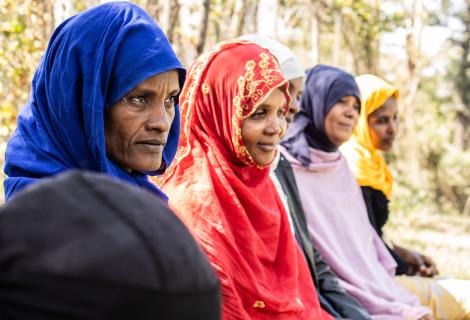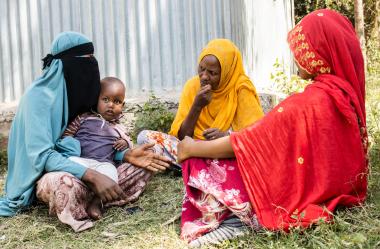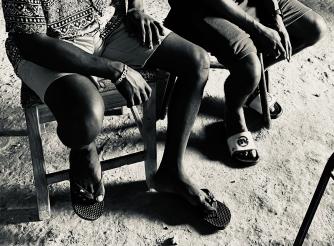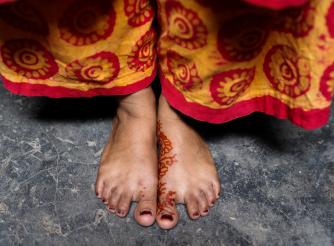Employment is only fair when the work is decent

This International Day for Domestic Workers, ActionAid calls for #SocialJusticeForAll.
Domestic work is the backbone of many societies. Cleaning, housekeeping, looking after the sick and elderly, cooking and childminding are a few of the many personal roles domestic workers perform. Despite this work's intimate and essential nature, domestic workers are often underpaid, exploited, and abused.
According to the latest reports from the International Labour Organisation (ILO), approximately 75.6 million people over 14 are employed as domestic workers globally. Of this figure, 11.5 million are migrant or foreign domestic workers.
Asia and the Pacific, with over 50% of the global figure, are home to the world's largest number of employed domestic workers. This is followed by the Americas and Africa with 23.3% and 12.7% respectively. However, domestic work represents the largest share of total wage employment in the Arab States, where domestic workers account for 14.8 per cent of all employees.
Gender and racial disparities
Care and domestic work primarily fall on women, and domestic work remains a female-dominated sector, with women accounting for 76.2% of all domestic workers. Racial disparities are also prevalent within the sector, and in the US, over 50% of domestic workers are from black and ethnic minority groups. In the UK, 1 in 8 black and ethnic minority women are employed in insecure jobs. Decent work is an intersectional feminist agenda that ensures social protection, fair wages, fair contracts, health and safety and a workplace free from discrimination, violence, and harassment.
The reality behind closed doors
Domestic workers in private homes are incredibly vulnerable; many often work in precarious settings and suffer violence and harassment in silence behind closed doors. Women domestic workers, in particular, are at high risk of sexual and gender-based violence. These doors may be closer to home than many realise. The US is home to approximately 2.2 million domestic workers. These workers are economically vulnerable and, on average, are paid considerably less than others. While in the UK, live-in domestic workers work incredibly long and volatile hours. The ILO estimates that 56.6 per cent of domestic workers, globally are employed with no legal limits to their normal working hours. Claims of mental, physical, and sexual abuse are prevalent in Saudi Arabia. At least 89 Kenyans, mostly domestic workers, died in Saudi Arabia between 2020-21.
Due to the hidden nature of this work, it's hard to quantify and know the accurate scale of injustices against domestic workers. This is especially true for undocumented migrant domestic workers. Lying at the intersection of gender inequality, racial injustice, prejudice, structural barriers, and poorly paid jobs are women migrant domestic workers.
Predominantly women from low-income countries in the global south, many with little education and without documentation or legal status. They have no social protection and become entirely dependent on their employers, increasing the risk of withheld wages, unfair or no formal contracts, exploitation, and abuse, and may end up finding themselves trapped in slavery-like conditions.

What needs to be done? Ratify ILO Convention 189!
The employment status of domestic workers must be formalised. For domestic work to be 'decent', it must first be recognised. Here's where the ILO Convention 189 comes in. This legally binding instrument not only recognises domestic workers, but its agenda is to protect and advance the rights of the millions of workers employed to do the caring and cleaning jobs historically undermined by society.
Its provisions include but are not limited to the elimination of all forms of forced labour and child labour, protection against all forms of abuse, harassment and violence, as well as decent working conditions, formal, fair contracts, minimum wage coverage and periods of rest. The convention also aims to ensure the same measures for migrant domestic workers. The ratification and subsequent integration of provisions into national legislation are critical in guaranteeing the rights of domestic workers.
Unfortunately, by 2022, only 36 governments had ratified the convention.
What is ActionAid doing to promote Decent Work for Domestic Workers?
Across the Federation, ActionAid is working with partners to raise awareness of injustices in the workplace and push for the ratification of ILO C189.
In Ethiopia, with funding from the Norad multi-country Combatting Modern Slavery Project, ActionAid Ethiopia and its partners have supported over 600 women, many of whom have returned from the Gulf States, with business skills training and a seed grant to start a profitable business and reduce the risk of illegal migration.
To amplify the voice of these women and survivors of injustices in the world of work and modern slavery situations, ActionAid launched the #HerStory campaign. You can learn more about the campaign here.
Call to Action
Domestic work is expected to remain in high demand across the world. Due to continued income inequality within and between countries and unequal access to education and care services, we need more decent jobs with decent wages, fair contracts, and good working conditions for all workers.
Join ActionAid in calling all governments to ratify ILO C189 and ensure #SocialJusticeForAll! Share this on Twitter and click here to hear the story of survivors.


